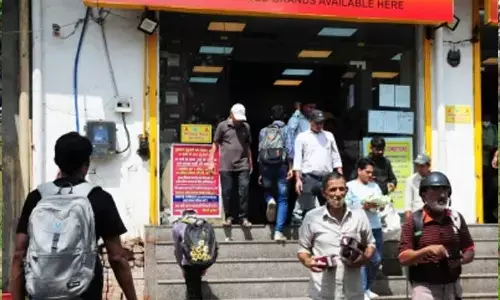IIT-Roorkee offers hope for deaf children

IIT-Roorkee offers hope for deaf children. \"I will make your sketch by the night,\" said Amar, closing his fingers like he was dimming the sunlight, as he continued talking in sign language.
Roorkee (Uttarakhand): "I will make your sketch by the night," said Amar, closing his fingers like he was dimming the sunlight, as he continued talking in sign language. He is one among 109 children at the deaf school, a first of its kind initiative by the Indian Institute of Technology-Roorkee (IIT-R), which gives them vocational training and helps them become self-reliant and confident.

Aman, who cannot speak or hear, conveyed through sign language about how much he enjoys his time at the school "Anushruti", which is celebrating its silver jubilee this year and has been an institution for children with hearing impairment who come here from far and wide, some as far as 60 km.
"It has been a wonderful experience. I have learned a lot here," Aman told this visiting IANS correspondent.
Anasuya Banerji, president of the school, said: "The school which started with humble beginnings, and just two students, has now helped thousands and enabled them to be self-reliant and self-confident.
"The school is based on community model. We educate these children and also help them in various vocational skills like stitching, cookery, art and craft," Banerji, who is the wife of IIT-R Director Pradipta Banerji, told IANS.
IIT-R is the only such institution in the country to support this kind of an initiative. Evolved from the confluence of two words "anu"(meaning small) and "shruti"(meaning sound), the school came into being in 1989.
It has now at least 10 faculty members, experts and counsellors who have the expertise and experience to teach the deaf children, who are generally in the 6-20 age-group.
Even though the school is meant for deaf children, at times, there are children who can't speak properly or not at all. Hence, the school offers a combination of various techniques to combat both issues.
"Techniques like using repetitive sounds, like the knocking of a door, or a doorbell sound are used to increase the attention span of these children," Shazia Farhat, a faculty member, told IANS.
The innovative ways of teaching have helped many to develop social skills, and become more confident.
Fourteen-year-old Adhiba and 16-year-old Aftar Jahan have benefited massively by enrolling themselves in the school.
"The school has completely changed the life of my two daughters who couldn't speak. But with the help of a concerned and experienced staff, my daughters can now understand each other's silent language," their mother Nirmala Negi recollected.
The school has now started inviting visiting faculty to give more exposure to the children.
Boston-based Wendy Jehlen, a trained bharatanatyam and contemporary dancer, specialises in teaching deaf children with a special technique called "flocking".
"Flocking is an art that helps these children to communicate with each other through movements and dance steps that the students are trained in," Jehlen told IANS during her visit to the school.
"I also work on story-telling through contemporary dance", she added.
According to Director Banerji, the management is looking at different avenues to reach out to more people who specialise in teaching these children, and offer placements as well.
"We are now looking to expand our horizons and collaborate with organisations engaged in hospitality management and skill development that can provide placements for deaf children in their organisation," he added.










